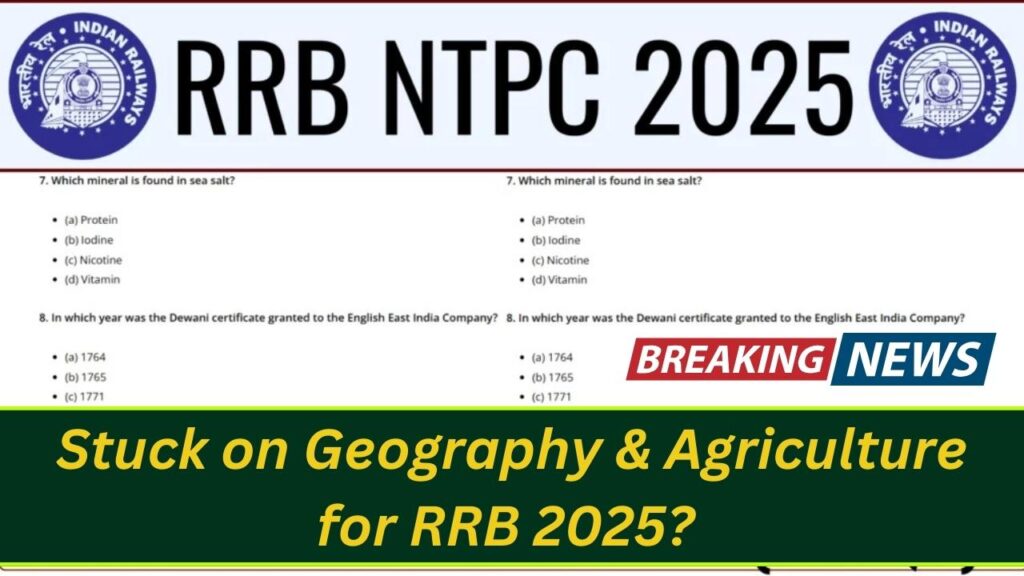Stuck on Geography & Agriculture for RRB 2025 – If you’re preparing for RRB 2025 exams, chances are you’ve felt overwhelmed by the vast syllabus—especially Geography and Agriculture. With so many concepts, locations, soil types, and farming techniques to remember, it’s natural to feel stuck. But here’s the good news: mastering these sections is easier than you think—and you don’t need to cram textbooks to do it.

In this article, we bring you curated Multiple Choice Questions (MCQs) on Geography and Agriculture specifically tailored for RRB aspirants. These questions not only test your understanding but also explain important concepts—making your revision smarter, not harder.
Stuck on Geography & Agriculture for RRB 2025
| Feature | Details |
|---|---|
| Topic | Geography & Agriculture MCQs for RRB 2025 |
| Best For | RRB Group D, NTPC, ALP, and JE aspirants |
| Includes | Solved MCQs, explanations, tips for retention |
| Official Link | RRB Official Website |
| Usefulness | High scoring potential in General Awareness section |
| Expert Tip | Focus on soil types, irrigation methods, and crop patterns |
Whether you’re just beginning or revising for the RRB 2025 exams, mastering Geography and Agriculture through MCQs is a smart, score-boosting strategy. Not only do these questions help clarify important concepts, but they also prepare your brain to think fast and recall better in the exam hall.
Why Focus on Geography and Agriculture for RRB?
In most Railway Recruitment Board (RRB) exams, especially Group D, NTPC, and ALP, General Awareness plays a crucial role. Within that, Geography and Agriculture make up a consistent 15–20% of the questions. Topics range from soil types and crop seasons to major dams and agricultural policies.
Ignoring these topics could cost you valuable marks—but a little targeted preparation using MCQs can boost your score and confidence quickly.
Top MCQs on Agriculture and Geography for RRB 2025?
Here are highly relevant and frequently asked MCQs that will make you exam-ready:
1. Where is the Coffee Research Station of India located?
- a) Munnar
- b) Kurnool
- c) Chikmagalur
- d) Mysore
Correct Answer: c) Chikmagalur
Explanation: Chikmagalur in Karnataka is renowned for its coffee plantations and hosts India’s primary coffee research facility.
2. Which soil is best suited for cotton cultivation?
- a) Alluvial
- b) Black
- c) Red
- d) Laterite
Correct Answer: b) Black
Explanation: Also called regur soil, black soil retains moisture and is rich in calcium and potassium, ideal for cotton farming.
3. What is the term for ‘slash and burn’ agriculture in India?
- a) Jhum
- b) Zaid
- c) Rabi
- d) Kharif
Correct Answer: a) Jhum
Explanation: Jhum is a traditional method of shifting cultivation, especially practiced in the northeastern states.
4. Which Indian state has the highest per hectare yield of wheat?
- a) Punjab
- b) Uttar Pradesh
- c) Haryana
- d) Bihar
Correct Answer: a) Punjab
Explanation: Due to mechanization, fertile soil, and irrigation, Punjab consistently leads in wheat productivity.
5. Which river valley is most associated with black soil?
- a) Ganga
- b) Krishna
- c) Godavari
- d) Narmada
Correct Answer: d) Narmada
Explanation: The Deccan Plateau, including the Narmada Valley, is known for its volcanic-origin black soil.
Additional Sample MCQs for Practice
6. Which of the following is a kharif crop?
- a) Wheat
- b) Barley
- c) Rice
- d) Mustard
Correct Answer: c) Rice
Explanation: Rice is sown with the onset of the monsoon and harvested in autumn, making it a typical kharif crop.
7. The Tropic of Cancer passes through how many Indian states?
- a) 6
- b) 8
- c) 9
- d) 11
Correct Answer: d) 11
Explanation: The Tropic of Cancer crosses 11 states in India including Gujarat, Rajasthan, MP, Chhattisgarh, Jharkhand, and others.
How to Use MCQs to Improve Retention?
Break the Pattern: Active Recall
Don’t just read—try answering before looking at options. This technique strengthens memory.
Mix It Up: Interleaved Practice
Switch between topics—one soil question, one crop question, one river question. This prepares your brain for the real test pattern.
Spaced Repetition
Revisit these MCQs every 3 days. Apps like Anki or Quizlet can help you track your progress.
Pro Tips to Score High in RRB Geography & Agriculture
Understand the Map
Learn the major rivers, states, crops, and soil belts using a physical map. Visual learning sticks better.
Watch YouTube Revision Videos
Use Testbook, Study IQ, or Unacademy sessions focused on RRB Agriculture & Geography. Audio-visuals are great for quick recaps.
Make Mnemonics
Example: “COLD” crops for Rabi Season – Chickpea, Oats, Lentils, Dry peas.
Important Topics You Must Master
1. Indian Soils
- Black, Red, Alluvial, Laterite, Desert, Mountain
- Soil conservation methods
2. Types of Agriculture
- Subsistence, Commercial, Plantation, Shifting, Organic
- Crop rotation and intercropping
3. Major Crops
- Wheat, Rice, Cotton, Sugarcane, Pulses, Tea, Coffee
- State-wise crop specialization
4. Irrigation Techniques
- Drip, Sprinkler, Canal, Tubewell
- Government irrigation schemes like PMKSY
5. Climatic Zones & Crop Suitability
- Agro-climatic regions and their influence on crop choices
6. Indian Geography Basics
- Longitudes, Latitudes, Tropic of Cancer
- Indian states and their geographical features
- Important dams and rivers
Resources to Practice More MCQs
- Testbook MCQ Practice Set
- RRB Official Mock Test Portal
- Karmasandhan’s RRB MCQ Sets
FAQs about Stuck on Geography & Agriculture for RRB 2025
Q1: Are Agriculture questions asked in RRB Group D exams?
Yes. Agriculture forms a key part of the General Awareness section.
Q2: How can I remember so many soil types and their characteristics?
Use mnemonics, diagrams, and video tutorials. Try drawing soil maps yourself.
Q3: How many questions from this topic can I expect?
You can expect 8–10 questions from Geography and Agriculture combined.
Q4: Is NCERT enough for preparation?
NCERTs from Class 6 to 10, especially Geography and Environmental Studies, are great. Supplement with MCQs and video sessions.
Q5: Where can I give mock tests for free?
Try platforms like Testbook, Gradeup, and Oliveboard.
Q6: Should I study current affairs related to agriculture too?
Absolutely. Questions on recent schemes, PM-KISAN, or climate-resilient crops are becoming more common.









